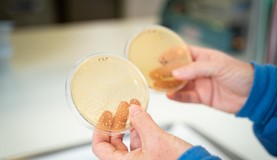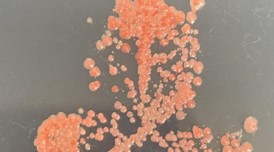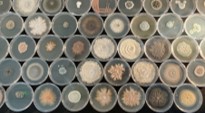OUR RESEARCH

Food spoilage and safety
The global market for processed foods is currently estimated at around 8 trillion dollars. Contemporary processes used to deliver microbiologically safe foods and to reduce economic food spoilage include chilling, drying, pasteurisation, a plethora of (natural) chemical preservatives, biopreservatives, modified atmosphere packaging and high pressure processing. Our expert team have more than 150 years' combined experience in the development, troubleshooting and validation of microbiologically stable and safe food processes and formulations. Our continuing research is focussed in particular on understanding the interactions of specific spoilage organisms and communities of spoilage associated microorganisms with various food hurdles, as well as the development of new methodologies for rapid identification of food spoilage bacteria, yeast and moulds in foods and manufacturing environments.
Contact us if you would like to learn more about our food research.

Fermentation
We work with industry and artisans alike to create unique fermented food products, and to help them develop a deeper understanding of their fermentation processes and starter cultures. We are also able to facilitate access to fermentation co-manufacturing, providing a unique R&D to NPD to manufacturing pathway for businesses. We have experience working with many different types of fermentations involving bacteria, fungi (yeast and mould) and algae. Our particular focus in fermentation is in food, using lactic acid bacteria. Our research includes understanding how different microbes grow under different fermentation conditions, in order to improve fermentation speed and increase yield at industrial scale, as well as the development of new methodologies for characterising communities of microorganisms involved in non-starter-culture (i.e. wild) fermentations, in the food industry, as well as during waste processing and energy production.
Contact us if you would like to learn more about fermentation research.

Animal microbiome
With a background in human gut health, our present research focus is on the microbial communities present in the horse hindgut, and how these microorganisms contribute to the spread of antimicrobial resistance genes, as well as how they contribute to the efficient breakdown of fibre for equine nutrition. Our animal gut health research is an area of research into which we invite high school students, through our CoLAB Zoo of Poo school science research program. Through this program, we aim to extend our knowledge of the microbial communities contributing to the gut health of lots of other hindgut fermenting animals, including zebras, koalas, iguanas, rhinos, orangutans and more!
Contact us if you would like to learn more about our gut research.

Crop microbiome
The health of us as humans is underpinned by the food that we eat, which is in turn underpinned by the health of our crops, which are both positively and negatively impacted by the microorgansims present in the cropping environment - including soils, irrigation water, soil-less growing media, additons to soils such as worm juice, protected cropping facilities and cold stores. Our research in crop health is focussed on characterising communities of microorganisms interacting with plants, during both cropping and post-harvest, rapid detection of plant and post-harvest pathogens and determination of beneficial crop-associated microbial communities.
Contact us if you would like to learn more about our crop research.

Functional Biodiversity
Functional biodiversity describes not just the types of microorganisms present in an environment, but also the things that they are doing there. Functional biodiversity includes understanding how communities of microorganisms interact with each other, and with the characteristics of the particular environmental niche in which they are found. These interactions include how microbes metabolise, the role they play in biogeochemical nutrient cycles, how they survive in and respond to changes in their environment , and how they sometimes swap genes in order to be able to do so. We're interested in microbes in water, waste and air, including in built environments and manufacturing settings.
We're interested in a bunch of functional traits found in microorganisms from a diverse range of environments, including antimicrobial production and resistance, bioelectrogenesis, extremophilism, fibrolytic capacity, methylotrophy and pigmentation. This is also a particular area of research into which we invite high school students, through our CoLAB school citizen science program, to join in on the fun of discovering new and talented microbes, and putting them through their paces!

Antimicrobial

Bioelectrogenic

Extremophilic

Fibrolytic

Methylotrophic

Pigmented
Contact us to learn more about our functional biodiversity research, or click on the images above to learn more about our various CoLAB education and engagement activities relating to functional biodiversity.

APPLIED MICROBIOLOGY & MICROBIOMICS
About Quantal
FOR EDUCATORS
Pioneering education
CONNECT WITH QB

We acknowledge the Bidjigal people of the Darug Nation who are the traditional owners of the land on which we work,
and pay our respects to Elders past, present and emerging.
Copyright © 2025 Quantal Bioscience – 28/10 Gladstone Rd Castle Hill NSW 2154 Australia – (+61) 2 8000 3720
PO Box 6225 Baulkham Hills NSW 2153 Australia contact@quantalbioscience.com